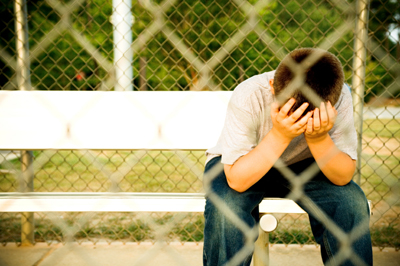Two things can doom a kid to a future of depression and addiction: Overprotective parents and clueless school districts. This is a post about both.
Mood music:
[youtube=http://www.youtube.com/watch?v=m9dW8_qOjzQ&fs=1&hl=en_US]
Neither case is one of evil. It’s about good intentions gone wrong. I think of the old saying, “The path to hell is paved with good intentions.”
In the case of overbearing parents, this was only partly true for me. My father was all about pushing me out into the world to learn how to survive. My mother was a different story. In her defense, she had already lost a child, so wanting to protect the kids she had left was understandable. While me and my sister still took a lot of abuse, I was also smothered to the point of wanting to explode. And that’s what I did.
I rebelled. I grew my hair long and started staying out all night. I learned to escape not just in food, but in alcohol and weed. Think of the trouble that fish Nemo got into in “Finding Nemo” when his father got too overprotective. Nemo rebelled by going out to that boat and got himself caught in the dentist-diver’s net. Later in the movie, when Marlin, the dad, says he promised never to let anything happen to Nemo, his friend Dory piped up, “If you never let anything happen to him, then nothing will ever happen to him.”
It all worked out for Nemo in the end and it has for me. But I’m getting ahead of myself.
Before I experienced all the ups and downs that ultimately led to recovery and salvation, I chafed against my mother’s smothering by shoving aside my studies.
The school district knew I was an emotional, troubled kid. I started getting extra help in elementary school because of the toll Crohn’s Disease had taken on my young body. It worked at first, but when I went to the Paul Revere School for seventh and eighth grade, it all went to hell for me.
There, kids were divided into three groups: The A group, the B group and the C group. The first was for the kids who consistently got As on their report cards. To the lower groups, they were sort of an elite class. The B group is where most kids were. Then there was my group, the C group, where the kids with bad grades were sent to rot. That may be a harsh description. I do believe the school was trying to do what was best for students. But the stigma of being on the low end of the student body was damaging all the same.
The C kids were never really encouraged to study their way to the B or A groups. We just got teachers that gave us the bear minimum for work and treated us like troublemakers to be kept in line.
Indeed, the C group was where all the troublemakers were. I was a quieter version of trouble. I mostly hurt myself by dabbling in addictive substances and ignoring the academics. Other kids in my class were always getting into fights and some were already getting arrested. There were some so-called normal kids in the mix who did study their way into the higher groups.
Some of the C kids got picked on a lot, including me, though I also met a lot of great kids along the way.
I remained a slacker in high school and it took a couple years of community college before I found my ability to study hard and advance.
I feel like I found my way despite a smothering parent and the mistakes of the Revere Public School system.
I should also note that this isn’t about bashing the Revere schools. That was all 25-plus years ago. I’m going to give them the benefit of the doubt and hope the A-B-C system of labeling kids is a relic of the past.
But in the final analysis, looking back, it’s easy for me to see how the mistakes of parents and educators fed into my struggles later in life. I fault no one. It’s not like God dropped us here with an instruction book for parenting and educating. The Ten Commandments aren’t clear about such specifics.
As a 40-year-old dad who takes an active interest in my children’s education, I still feel like I’m winging it for much of the time.
Before I managed to bring the OCD to heel, I was a basket case about making sure the kids were shielded from danger. It just led to me becoming more of a basket case and, because being that way is exhausting, it made me too tired to do other things with them that I should have been doing. 
All I can say is thank God for abstinence and sobriety — as much as staying clean can suck from time to time — and thank God for Erin, who has been especially relentless about teaching those boys right from wrong and making them study hard. Together, I’d like to think we’re pretty good parents and that we give Sean and Duncan the right mix of love and discipline.
But because of where I’ve been, I ALWAYS worry about how my actions will impact them.
That paranoia is probably a good thing.




